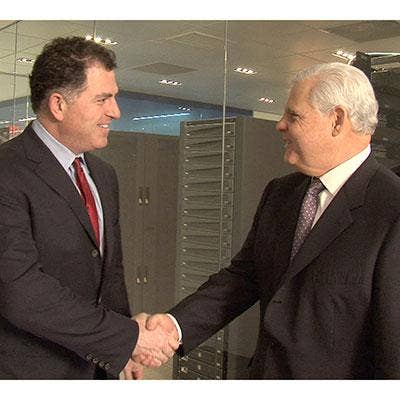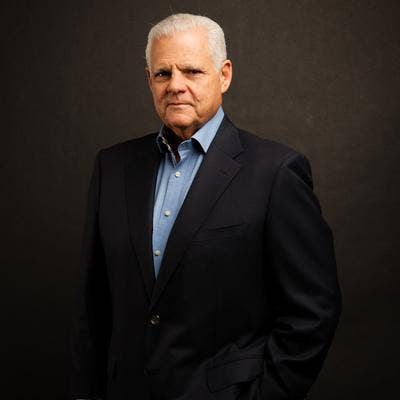Play The Guessing Game: Will EMC Be Acquired, Merge, Or Go It Alone?

Under Pressure: EMC Considers The Alternatives
Investor pressure has recently pushed EMC to explore a couple of alternatives, including selling its 80 percent stake in VMware, or either merging with or selling itself to a major systems vendor, with our without its VMware stake. So far, EMC has resisted the pressure despite entering into active negotiations with Hewlett-Packard and Dell, and perhaps others, according to reports.
What's behind this move to change EMC? Will EMC give in or remain the independent company it now is? What would be the impact to the industry and the channel under various scenarios should EMC give into investor moves?
CRN has been actively digging deep on these and related questions. Explore the possibilities of what could either be an IT industry game-changer or just another footnote in the history of IT.

Setting The Scene
Reports from The Wall Street Journal and Barron’s say that EMC held discussions with Hewlett-Packard and Dell, and possibly Oracle and Cisco as well, about the possibility of combining with one of them either as a merger of equals or by being purchased outright. However, those talks seem to have ended with no move on anyone's part so far. And while it appears that such a move will not happen in the near future, that could change at any time.
Interest in the topic actually started in July when it was revealed that activist investment firm Elliot Management had acquired a $1 billion equity stake in EMC, or nearly 2 percent of that company's shares, making it EMC's fifth-largest investor. Elliot Management started pressuring EMC to sell its 80 percent stake in VMware, but EMC said it preferred to keep EMC as a whole.

The Situation
While EMC is outdoing many of its peers financially, part of that success is directly related to its stake in VMware.
Joseph Wittine, a senior equity analyst at Longbow Research, told CRN that investor pressure for EMC to merge or be acquired stems in part from the math related to EMC's valuation in the event that it would sell its VMware business.
EMC has a market capitalization of about $61 billion, while VMware has a market capitalization of about $40 billion. Subtracting VMware's share of EMC's market capitalization and earnings gives the core EMC business a valuation of about $29 billion, which is only under 10x earnings, which Wittine said was low compared to rivals such as NetApp.

Why Would EMC Consider Alternatives?
EMC touts what it calls the EMC Federation, which includes EMC, VMware, big data and business analytics software developer Pivotal, and security developer RSA.
Elliot Management argues that the EMC Federation hampers the value of EMC's core storage business. EMC, for its part, has publicly stated it prefers to keep with the EMC Federation model and not break up into smaller parts.
Despite its stance, EMC has no choice but to consider proposals from major shareholders. As a public company, EMC's board of directors must carry out their fiduciary duty, which according to The Law Dictionary comes into play when one party must act for another and "are entrusted with the care of property or funds."

EMC Vows To Keep VMware
Soon after Elliott Management started pressing EMC to sell its VMware stake, EMC held its second fiscal quarter financial analyst call.
That conference call was unusual in that EMC Chairman and CEO Joe Tucci led with his thoughts on the question of whether or not to sell its VMware stake. He also fielded several questions about the issue.
"Without a doubt, we have some great assets. ... To me, splitting them up, spinning out one of your most strategic assets -- I don't know of any other tech company that has done that and been successful," Tucci said.

The Alternatives: Status Quo
EMC for now appears to be executing its strategy of doing nothing drastic in response to investor calls for change.
Talks between EMC and HP seem to be over for now, and that is likely the case in discussions with other vendors. The status quo gives EMC the opportunity to continue developing new technologies for modern data centers while taking advantage of its huge-if-not-growing storage business.
It's easy to overlook the fact that EMC, in combination with VMware, has one of the most complete cloud and software-defined technology portfolios, including software-defined data center, storage, and networking capabilities. And despite its large storage hardware base, EMC could quickly turn around and go all software-defined storage faster than anyone.

The Alternatives: Sell Or Spin Out VMware
Spinning out VMware as a separate company or selling it outright would likely result in a good short-term return to investors who see the parent company as a struggling legacy vendor. Such a move would clear the way for the remainder of EMC to be acquired at a much lower price by a company with an interest in EMC's storage business.
VMware in such a situation would likely become an immediate acquisition target by the systems vendors who see great value in VMware's technology. However, the value of VMware stems heavily from being able to develop its technology independent of what any other vendor wants. EMC, in that regard, has been the ideal steward of VMware.

The Alternatives: Sale To Or Merge With HP
Talks between HP and EMC about a possible merger of equals appear to have gone to a fairly advanced state, although they seem to have stalled when EMC asked for a premium that HP was unwilling to pay, according to several reports. HP, which went through two messy acquisitions with Autonomy and Palm, may also have been wary about getting EMC.
EMC and HP have been arch-rivals ever since the two went through a messy divorce over 15 years ago despite a long-term relationship under which HP resold EMC storage hardware.
It is unclear how serious the two were about a merger or acquisition this year. It is possible EMC went into discussions with a high price as a way to tell investors, "Hey, we talked, but it didn't work out."

The Alternatives: Sale To Or Merge With Dell
Dell was also in talks to acquire or merge with EMC, according to reports. Dell CEO Michael Dell this week told CNBC that his company is interested in potential storage acquisitions without specifically naming EMC. However, unlike HP, Dell may have been harder-pressed to come up with the necessary funding given Dell's relative size and the fact that it only last year went through an expensive process to turn itself into a private company.
Dell used to be EMC's biggest reseller partner, but that relationship ended starting when Dell in 2008 acquired EqualLogic. That acquisition, along with other acquisitions including Compellent and Quest Software, have already made Dell a major storage power in its own right, with plenty of overlap between its and EMC's business.

The Alternatives: Sale To Or Merge With Cisco
Of all the possible combinations of EMC and a systems vendor, one with Cisco would be the most likely given how closely the two partner via their VCE joint venture and on developing VSPEX converged reference architectures. Furthermore, the two have practically no overlap in terms of storage offerings, although the software-defined networking technologies in VMware's NSX and Cisco's ACI offerings strongly overlap and would come under scrutiny if a merger or acquisition were announced.
However, Cisco Chairman and CEO John Chambers was quoted Wednesday by The Wall Street Journal as saying that a possible Cisco deal for EMC would have happened "a year or two ago" and that there are no such deals currently being discussed.

The Alternatives: Sale To Or Merge With Oracle
Little has been said about how deep any conversations between EMC and Oracle on a possible merger or acquisition went.
Oracle's focus on middleware and on engineered systems is different from EMC's product strategy. While little product overlap is a good thing in a merger or acquisition, the two companies have such divergent strategies as to make a deal hard to integrate.
However, if any company can successfully acquire another with a totally different product strategy, Oracle is the one to do it as it showed with its 2010 acquisition of Sun Microsystems. Even so, there are few indications that Oracle is inclined to try again with EMC.

The Alternatives: Sale To Or Merge With IBM
Reports of possible merger partners or acquirers have been silent about one other potential suitor: IBM.
While IBM is selling its x86 server business to Lenovo, it has staked part of its future on the storage and converged infrastructure markets, and could possibly get a huge boost in both from a deal with EMC. IBM traditionally OEMs a significant part of its storage business from other vendors, and so it could take advantage of EMC's storage technology. IBM, like HP and Dell, could also benefit from acquiring VMware.

What Will The Future Hold?
Given that EMC does not want to be broken up or sold, and that many potential suitors don't have the financial capability or intestinal fortitude to take on a merger with or acquisition of EMC, chances are that the status quo will rule and EMC will remain an independent company completely happy with its VMware stake.
One variable is that EMC Chairman and CEO Joe Tucci is slated to retire in February 2015. Unlike many companies EMC's size, EMC has at least three solid executives who could easily step in and take the reins when Tucci retires. That is, assuming he does retire, an assumption that could prove wrong as it has already in the past couple of years.
Placing a bet on the status quo could be the safest yet in the story of what will happen to EMC.